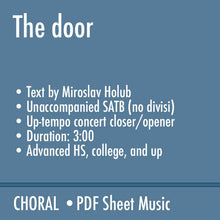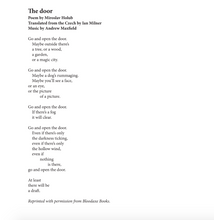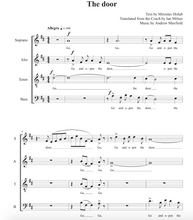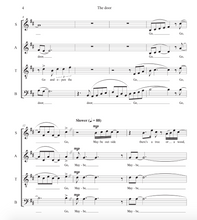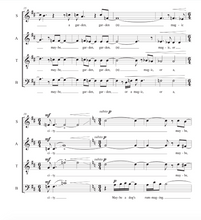
"The Door was a worthwhile challenge! Like life, it is filled with surprises and twists that were fun to learn and to sing. This is a piece that I look forward to programming again!"—Julian Bryson, Director of Choral Activities, Jacksonville University
"In 'The door,' Maxfield explores creative compositional tools that are engaging to singers and audiences alike. He successfully captures the whimsical nature of the poetry."—Dr. Kenney Potter, Director of Choral Activities & Chair, Music Department, Wingate University
"Succinct, witty, yet still profound, like so much of Andrew's music, 'The door' proved to be a delight for both singers and audience."—Daniel Gee, Choral Arts Initiative, Assistant Conductor / Long Beach Symphony, Assistant Conductor
"Go," says poet Miroslav Holub, "and open the door." Go where? Open which door? To my ears, Holub's playful text is an invitation—maybe even a good-natured dare—for us to open ourselves to the unknown and unfamiliar. Sure, he teases us with some whimsical imagery—maybe there's a magic city or a rummaging dog on the other side of the door—but he leads us to a profound realization: even if "nothing" is there, it's still worth opening the door, if only to let in the breeze. Even though we live in a hyperconnected era that can bring us into contact with just about anyone or anything, it's easy tacitly to dismiss "unfamiliar" as bad. We do it all the time with "othered" people and ways of living, even "other" countries. To the extent that a certain fearful mania grips so many people these days, let's fight back, if for no other reason than our own sanity and joy, by opening the door!
Also, there's a certain jauntiness in the text. It's fun, it's mysterious, it's as cheerful as it is urgent. I wanted to mirror those qualities in the shifting moods and colors of the music. There are Gospel- and Appalachia-inspired shouty bits and there quiet, pondering, foggy bits. All in all, the theme of "going" and "opening" guided my design decisions. Finally, given the playful spirit of (the English translation of) Holub's text, I gave myself permission to be playful with the sounds of the words themselves, like stretching and contorting the diphthong "eye" (ah-ee) and playing up the fact that the interior "f" of draught/draft (breeze) actually sounds like a draft if you let it!




